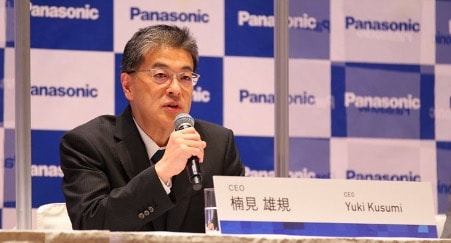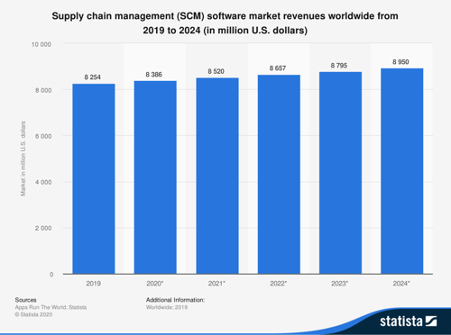Panasonic Corp. is a Japanese multinational electronics company, headquartered in Kadoma, Osaka. It offers a wide range of products and services like rechargeable batteries and industrial systems. To improve the quality of the products and services offered to clients, Panasonic has announced on Friday 23 April its intention to buy the U.S. supply-chain software provider Blue Yonder Holding Inc. from Blackstone Group Inc. and New Mountain Capital LLC for $7.1 billion. The rationale behind the deal is linked to the increasing importance of supply-chain management after the COVID-19 pandemic. It represents also a renaissance of overseas acquisitions from Japanese companies.
Panasonic's CEO Yuki Kusumi
The pre-acquisition planned IPO
Blue Yonder is based in Scottsdale, Arizona, and sells an end-to-end supply chain management platform that helps to identify potential problems in tasks like demand planning, sales, and operations planning, based on the power of AI and machine learning.
The company was on a singular IPO path and already submitted its S-1 to the US Securities and Exchange Commission (SEC). In the last months, many large companies made some interesting offers for acquiring Blue Yonder, but the management decided to go with Panasonic as the latter decided to leave them standalone within the company and continue with its vision of an autonomous supply chain.
Panasonic and Blue Yonder relationship
In January 2019, the two companies built a strategic partnership, followed by the creation of a joint venture company in Japan in November 2019. Then, Panasonic bought a 20% stake in Blue Yonder last July, and it will purchase the remaining 80% from private equity groups Blackstone and New Mountain Capital for $8.5bn, including debt. The value of the US group’s enterprise has boomed from last year's $5.5bn as during the pandemic there was an increasing demand for software that could help companies in managing logistics and shipping.
Why does Panasonic want to buy Blue Yonder?
Blue Yonder is one of the leading companies in the supply chain industry, providing its cloud-based platform Luminate mainly to global retail, manufacturing, and logistics customers, allowing them to manage all nodes of the supply chain, execution, and commerce.
During the 14 months of the pandemic, Blue Yonder has added 134 new customers to its list, but despite this, the customer list has not changed its composition of 50% retail, 40% manufacturing, and 10% third-party logistics, where no client contributes for more than 5% revenue. With this deal, Panasonic will be able to flank Blue Yonder’s software to its traditional business of selling hardware like security cameras, strengthening its position in the market. Furthermore, this acquisition accelerates the companies’ shared Autonomous Supply Chain (ASC) mission, which aims at optimizing supply chains by using the power of AI/ML and IoT and edge devices for better predictions to pivot their operations in real-time. In this way, thanks to this combination of technologies, the supply chain would be able to operate without people.
Combining the two companies’ strengths and technologies would increase the customer value of Blue Yonder’s leading digital platform. The pandemic proved the essential role played by Blue Yonder’s platform, as they help customers to deliver efficiently goods to their customers. Together, they will give customers, including Coca-Cola, Walmart, Caterpillar, DHL, Marks & Spencer, and Best Buy, a unique competitive advantage, creating automation and providing real-time business insights which will reduce waste and improve operations. Moreover, the companies will contribute at the same time to the creation of a more sustainable world.
The pre-acquisition planned IPO
Blue Yonder is based in Scottsdale, Arizona, and sells an end-to-end supply chain management platform that helps to identify potential problems in tasks like demand planning, sales, and operations planning, based on the power of AI and machine learning.
The company was on a singular IPO path and already submitted its S-1 to the US Securities and Exchange Commission (SEC). In the last months, many large companies made some interesting offers for acquiring Blue Yonder, but the management decided to go with Panasonic as the latter decided to leave them standalone within the company and continue with its vision of an autonomous supply chain.
Panasonic and Blue Yonder relationship
In January 2019, the two companies built a strategic partnership, followed by the creation of a joint venture company in Japan in November 2019. Then, Panasonic bought a 20% stake in Blue Yonder last July, and it will purchase the remaining 80% from private equity groups Blackstone and New Mountain Capital for $8.5bn, including debt. The value of the US group’s enterprise has boomed from last year's $5.5bn as during the pandemic there was an increasing demand for software that could help companies in managing logistics and shipping.
Why does Panasonic want to buy Blue Yonder?
Blue Yonder is one of the leading companies in the supply chain industry, providing its cloud-based platform Luminate mainly to global retail, manufacturing, and logistics customers, allowing them to manage all nodes of the supply chain, execution, and commerce.
During the 14 months of the pandemic, Blue Yonder has added 134 new customers to its list, but despite this, the customer list has not changed its composition of 50% retail, 40% manufacturing, and 10% third-party logistics, where no client contributes for more than 5% revenue. With this deal, Panasonic will be able to flank Blue Yonder’s software to its traditional business of selling hardware like security cameras, strengthening its position in the market. Furthermore, this acquisition accelerates the companies’ shared Autonomous Supply Chain (ASC) mission, which aims at optimizing supply chains by using the power of AI/ML and IoT and edge devices for better predictions to pivot their operations in real-time. In this way, thanks to this combination of technologies, the supply chain would be able to operate without people.
Combining the two companies’ strengths and technologies would increase the customer value of Blue Yonder’s leading digital platform. The pandemic proved the essential role played by Blue Yonder’s platform, as they help customers to deliver efficiently goods to their customers. Together, they will give customers, including Coca-Cola, Walmart, Caterpillar, DHL, Marks & Spencer, and Best Buy, a unique competitive advantage, creating automation and providing real-time business insights which will reduce waste and improve operations. Moreover, the companies will contribute at the same time to the creation of a more sustainable world.
Automation Strategic Focus
Blue Yonder CEO with the extended leadership team will join the new organization of Panasonic’s Connected Solutions Company, which will become, on April 1, 2022, Panasonic Connect Co., Ltd., and Blue Yonder will be retained and continue to function under this new umbrella. The transaction has been approved by the Board of Directors of both Panasonic and Blue Yonder, but it would be concluded by the second half of fiscal 2021. It would be a huge help for enterprises, as the ASC is about speed, resilience, and accuracy. Indeed, in industries such as pharmaceuticals, it means tracking shipments to ensure optimum conditions and reduce the risk of supply chain fraud.
Some concerns
Japanese hardware companies have always had some problems with software innovation, and due to Japan’s shrinking population and the US developed disruptive technologies, Japanese companies started in the past decades to pursue overseas M&A to remain competitive. The pandemic, by reducing international travel and increasing uncertainties, caused a reduction in overseas deals from Japanese companies, but according to an analyst of Bank of America, in the first quarter of 2021, Japan’s outbound deals number resurged. Still, the real reason for this acquisition is not clear to R “Ray” Wang, founder of Constellation Research. He asserts that even if Blue Yonder is one of the best vendors in the supply chain management market, its products are old and lack of advanced capabilities that modern software need.
As the pandemic ends and the global economy begins to recover from it, the focus on improving supply chains is clear. This acquisition surely increases Panasonic's strength, but only time will tell us whether it was worth it.
Alessandro Chen
Want to keep up with our most recent articles? Subscribe to our weekly newsletter here.
Blue Yonder CEO with the extended leadership team will join the new organization of Panasonic’s Connected Solutions Company, which will become, on April 1, 2022, Panasonic Connect Co., Ltd., and Blue Yonder will be retained and continue to function under this new umbrella. The transaction has been approved by the Board of Directors of both Panasonic and Blue Yonder, but it would be concluded by the second half of fiscal 2021. It would be a huge help for enterprises, as the ASC is about speed, resilience, and accuracy. Indeed, in industries such as pharmaceuticals, it means tracking shipments to ensure optimum conditions and reduce the risk of supply chain fraud.
Some concerns
Japanese hardware companies have always had some problems with software innovation, and due to Japan’s shrinking population and the US developed disruptive technologies, Japanese companies started in the past decades to pursue overseas M&A to remain competitive. The pandemic, by reducing international travel and increasing uncertainties, caused a reduction in overseas deals from Japanese companies, but according to an analyst of Bank of America, in the first quarter of 2021, Japan’s outbound deals number resurged. Still, the real reason for this acquisition is not clear to R “Ray” Wang, founder of Constellation Research. He asserts that even if Blue Yonder is one of the best vendors in the supply chain management market, its products are old and lack of advanced capabilities that modern software need.
As the pandemic ends and the global economy begins to recover from it, the focus on improving supply chains is clear. This acquisition surely increases Panasonic's strength, but only time will tell us whether it was worth it.
Alessandro Chen
Want to keep up with our most recent articles? Subscribe to our weekly newsletter here.

